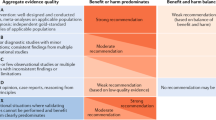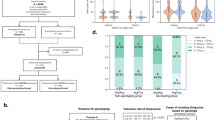Abstract
Background
Control of serum uric acid (sUA) levels is very important during chemotherapy in patients with malignant tumors, as the risks of tumor lysis syndrome (TLS) and renal events are increased with increasing levels of sUA. We investigated the efficacy and safety of febuxostat, a potent non-purine xanthine oxidase inhibitor, compared with allopurinol for prevention of hyperuricemia in patients with malignant tumors, including solid tumors, receiving chemotherapy in Japan.
Methods
An allopurinol-controlled multicenter, open-label, randomized, parallel-group comparative study was carried out. Patients with malignant tumors receiving chemotherapy, who had an intermediate risk of TLS or a high risk of TLS and were not scheduled to be treated with rasburicase, were enrolled and then randomized to febuxostat (60 mg/day) or allopurinol (300 or 200 mg/day). All patients started to take the study drug 24 h before chemotherapy. The primary objective was to confirm the non-inferiority of febuxostat to allopurinol based on the area under the curve (AUC) of sUA for a 6-day treatment period.
Results
Forty-nine and 51 patients took febuxostat and allopurinol, respectively. sUA decreased over time after initiation of study treatment. The least squares mean difference of the AUC of sUA between the treatment groups was −33.61 mg h/dL, and the 95 % confidence interval was −70.67 to 3.45, demonstrating the non-inferiority of febuxostat to allopurinol. No differences were noted in safety outcomes between the treatment groups.
Conclusion
Febuxostat demonstrated an efficacy and safety similar to allopurinol in patients with malignant tumors receiving chemotherapy.
Trial registry
http://www.clinicaltrials.jp; Identifier: JapicCTI-132398.


Similar content being viewed by others
References
Coiffier B, Altman A, Pui CH et al (2008) Guidelines for the management of pediatric and adult tumor lysis syndrome: an evidence-based review. J Clin Oncol 26:2767–2778
Cairo MS, Coiffier B, Reiter A et al (2010) TLS Expert Panel. Recommendations for the evaluation of risk and prophylaxis of tumour lysis syndrome (TLS) in adults and children with malignant diseases: an expert TLS panel consensus. Br J Haematol 149:578–586
Jones GL, Will A, Jackson GH et al (2015) Guidelines for the management of tumour lysis syndrome in adults and children with haematological malignancies on behalf of the British Committee for Standards in Haematology. Br J Haematol 169:661–671
Ramasamy SN, Korb-Wells CS, Kannangara DR et al (2013) Allopurinol hypersensitivity: a systematic review of all published cases, 1950-2012. Drug Saf 36:953–980
Allen KC, Champlain AH, Cotliar JA et al (2015) Risk of anaphylaxis with repeated courses of rasburicase: a Research on Adverse Drug Events and Reports (RADAR) project. Drug Saf 38:183–187
Lopez-Olivo MA, Pratt G, Palla SL et al (2013) Rasburicase in tumor lysis syndrome of the adult: a systematic review and meta-analysis. Am J Kidney Dis 62:481–492
Takai M, Yamauchi T, Ookura M et al (2014) Febuxostat for management of tumor lysis syndrome including its effects on levels of purine metabolites in patients with hematological malignancies - a single institution’s, pharmacokinetic and pilot prospective study. Anticancer Res 34:7287–7296
Maie K, Yokoyama Y, Kurita N et al (2014) Hypouricemic effect and safety of febuxostat used for prevention of tumor lysis syndrome. SpringerPlus 3:501
Spina M, Nagy Z, Ribera JM et al (2015) FLORENCE: a randomized, double blind, phase III pivotal study of febuxostat versus allopurinol for the prevention of tumor lysis syndrome (TLS) in patients with hematologic malignancies at intermediate to high TLS risk. Ann Oncol 26:2155–2161
Lebowitsch J, Ge Y, Young B et al (2012) Generalized multidimensional dynamic allocation method. Stat Med 31:3537–3544
Acknowledgments
This study was conducted by the following physicians and study centers—Kenichi Ishizawa and Yoko Okitsu (Tohoku University Hospital); Osamu Sasaki (Miyagi Cancer Center); Makoto Maemondo (Miyagi Cancer Center); Masahiro Kizaki (Saitama Medical Center); Noriko Doki (Komagome Hospital); Hiroki Yamaguchi (Nippon Medical School Hospital); Kaoru Kubota (Nippon Medical School Hospital); Kentaro Watanabe (Tokyo Saiseikai Central Hospital); Hironori Ueno (Tokyo Medical Center); Akira Fujita (Showa General Hospital); Katsumichi Fujimaki (Fujisawa City Hospital); Yasukazu Kawai (Fukui Prefectural Hospital); Takashi Nakayama (Fukui-ken Saiseikai Hospital); Keita Kirito (University of Yamanashi); Masataka Okamoto (Fujita Health University Hospital); Toshiki Uchida (Japanese Red Cross Nagoya Daini Hospital); Hirokazu Nagai and Hiroatsu Iida (Nagoya Medical Center); Mitsuru Itoh (Kyoto City Hospital); Masaya Okada (Hyogo College of Medicine); Junji Suzumiya (Shimane University Faculty of Medicine); Kenichi Gemba (Fukuyama Medical Center); Toru Kiguchi (Chugoku Central Hospital); Tetsuya Goto (Tokushima Red Cross Hospital); Masahiko Kaneko (Uwajima City Hospital); Tomoaki Fujisaki (Matsuyama Red Cross Hospital); and Kazuo Tamura (Fukuoka University Hospital). This study was funded by Teijin Pharma Ltd., Tokyo, Japan. Teijin Pharma was involved in the design, conduct, and analysis of the study.
Author information
Authors and Affiliations
Corresponding author
Ethics declarations
Conflict of interest
This study was funded by Teijin Pharma Ltd., Tokyo, Japan. Kazuo Tamura was the Coordinating Investigator and Takanori Ueda was the Medical Expert for this study. In addition, Takanori Ueda received honoraria, fees for promotional materials, and research funding from Teijin Pharma Ltd. Toru Kiguchi received honoraria from Teijin Pharma Ltd. Kenji Takeda and Akihiro Nakajima are employees of Teijin Pharma Ltd. The other authors have no conflict of interest to declare.
About this article
Cite this article
Tamura, K., Kawai, Y., Kiguchi, T. et al. Efficacy and safety of febuxostat for prevention of tumor lysis syndrome in patients with malignant tumors receiving chemotherapy: a phase III, randomized, multi-center trial comparing febuxostat and allopurinol . Int J Clin Oncol 21, 996–1003 (2016). https://doi.org/10.1007/s10147-016-0971-3
Received:
Accepted:
Published:
Issue Date:
DOI: https://doi.org/10.1007/s10147-016-0971-3




